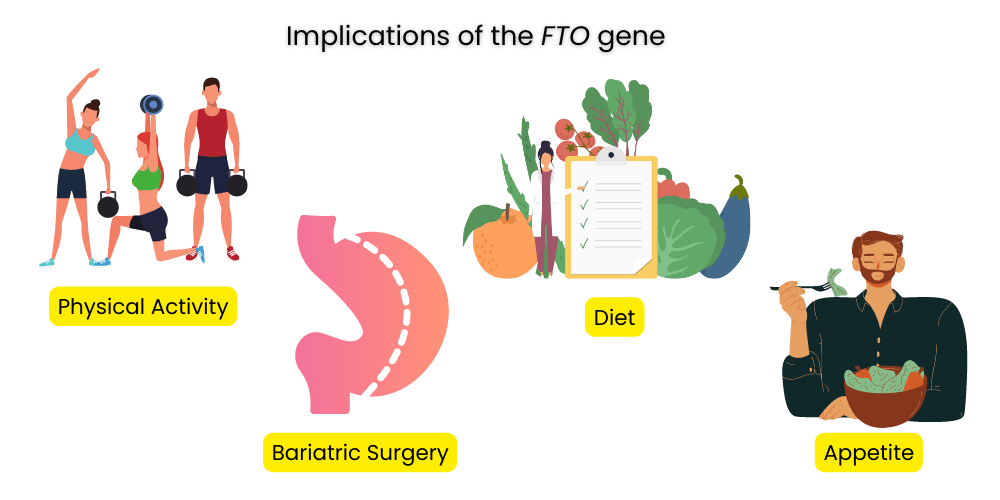Obesity Genes: Understanding the Role of Genetics

Table of Contents
What is Obesity?
Obesity is a medical condition characterized by an excess of body fat. It’s typically quantified using the Body Mass Index (BMI), a measurement calculated by dividing a person’s weight in kilograms by the square of their height in meters. A BMI of 30 or above is generally considered obese.
According to the World Health Organization, obesity has nearly tripled worldwide since 1975. In 2016, more than 1.9 billion adults were overweight, and of these over 650 million were obese.
How Do Genes Affect Obesity?
Scientific research has established that genetics play a significant role in obesity. Studies of families, twins, and adopted individuals suggest that as much as 40-70% of the variation in BMI may be determined by genes. However, obesity is a complex disorder, influenced by many genetic and environmental factors.
Are There Obesity Genes?
While there isn’t a single “obesity gene,” researchers have identified many specific genes that are associated with an increased risk of obesity. These genes may affect appetite and metabolism, or how your body converts food into energy.
How Does the FTO Gene Affect Obesity?
The FTO gene, short for the fat mass and obesity-associated gene, has been the subject of many studies due to its association with obesity and higher body mass index (BMI). The FTO gene is found in every body cell and has several variants, some of which have been linked to an increased risk of obesity.

Role of the FTO gene
The FTO gene is involved in the control of food intake and diet-induced thermogenesis, which is the process of energy production in the body from food consumption. However, the precise biological mechanisms by which FTO variants contribute to obesity are still under investigation.
Risk variants of the FTO gene
One of the most well-known risk variants of the FTO gene is rs9939609. Studies have found that individuals with two copies of the risk variant (the ‘A’ allele) of rs9939609 weigh on average about 3 kilograms more and have a 1.7-fold increased risk of obesity compared to those who do not carry this variant.
FTO gene and eating behavior
Emerging evidence suggests that FTO may influence obesity risk by affecting eating behavior. For example, research has shown that people with the risk variant of FTO may have a stronger preference for high-calorie foods, and they may feel less satiated after meals, leading to overeating.
Additionally, some studies have suggested that the FTO gene may interact with physical activity levels. For example, the obesity risk associated with the FTO variant appears to be less pronounced in people who are physically active compared to those who are inactive. This underlines the importance of lifestyle factors in mitigating genetic risk.
However, it’s crucial to remember that while the FTO gene can influence the risk of obesity, it doesn’t dictate the outcome. Lifestyle factors such as diet and physical activity play significant roles and can potentially offset genetic risk.
Other Genes That Influence Obesity
In addition to FTO, other genes linked to obesity include MC4R, which is involved in appetite regulation and energy homeostasis, and POMC, which plays a role in energy balance and appetite suppression. Each of these genes contributes modestly to the risk of obesity, and their effects can be compounded by environmental and lifestyle factors.
Non-Genetic Factors That Influence Obesity
While genetics can significantly influence the risk of obesity, it’s not the only factor. Non-genetic contributors to obesity include lifestyle habits such as diet and physical activity, environmental factors like access to healthy foods and safe places to exercise, as well as sociocultural influences and stress.
How to Prevent or Manage Obesity Based on Your Genes?
Obesity is a complex condition influenced by numerous factors, including your genes. Understanding your genetic predisposition to obesity can help you take proactive steps to manage your weight effectively. Here are some strategies for preventing or managing obesity based on your genes.
Understand Your Genetic Risk
Firstly, understanding your genetic risk can be the starting point for creating a personalized plan to prevent or manage obesity. Genetic testing can provide insights into how your genes may influence your body’s metabolism, appetite, and how you respond to different types of diet and exercise.

For instance, if you carry the risk variant in the FTO gene, which is associated with increased appetite and preference for high-calorie foods, you may want to pay extra attention to portion control and choose low-calorie, nutrient-dense foods.
Customize Your Diet
Different people may respond differently to various types of diets due to their genetic makeup. Some people might be more successful with a low-fat diet, while others may benefit more from a low-carb diet.

For example, research has shown that people with certain genetic variants may have better weight loss success with a diet that is lower in fat. Knowing your genetic predisposition can help you and your healthcare provider or nutritionist develop a dietary plan that suits you best.
Tailor Your Physical Activity
Similarly, genetic variations can also influence how your body responds to different types of physical activity. Some people might be genetically predisposed to benefit more from endurance exercises like running or cycling, while others might see more benefits from resistance training.

Understanding your genetic makeup can help guide your choices in the types of physical activities and workouts that you might enjoy more and be more likely to stick with in the long run.
Seek Professional Guidance
If you’re at a higher genetic risk for obesity, it can be helpful to seek advice from healthcare professionals. They can provide you with personalized strategies based on your genetic risk, lifestyle, and personal circumstances. This can include dietitians, physical trainers, or even genetic counselors who can help you understand your genetic information.
Emphasize Lifestyle Modifications
Even with a genetic predisposition to obesity, lifestyle modifications play a crucial role in weight management. This includes maintaining a balanced diet, staying physically active, getting enough sleep, and managing stress. Lifestyle changes can be a powerful tool for weight management, regardless of your genetic makeup.
Section Summary
While your genes may influence your risk of obesity, they do not seal your fate. With understanding and proactive management, it is possible to manage your weight effectively.
Summary
Q: How do genes affect obesity?
A: Genes can influence the risk of obesity by affecting factors like appetite, metabolism, and how your body converts food into energy.
Q: Is there an obesity gene?
A: While there isn’t a single “obesity gene,” many genes, including FTO, MC4R, and POMC, have been associated with an increased risk of obesity.
Q: Can you prevent or manage obesity based on your genes?
A: Yes, understanding your genetic risk can help guide strategies for prevention and management, such as diet, physical activity, and other lifestyle modifications.
References
- World Health Organization. Obesity and overweight. 2021.
- Frayling TM, Timpson NJ, Weedon MN, et al. A common variant in the FTO gene is associated with body mass index and predisposes to childhood and adult obesity. Science. 2007;316(5826):889-894.
- Loos RJ, Yeo GS. The bigger picture of FTO: the first GWAS-identified obesity gene. Nat Rev Endocrinol. 2014;10(1):51-61.
- Locke AE, Kahali B, Berndt SI, et al. Genetic studies of body mass index yield new insights for obesity biology. Nature. 2015;518(7538):197-206.
- Elks CE, den Hoed M, Zhao JH, et al. Variability in the heritability of body mass index: a systematic review and meta-regression. Front Endocrinol (Lausanne). 2012;3:29.
Written By
Share this article












